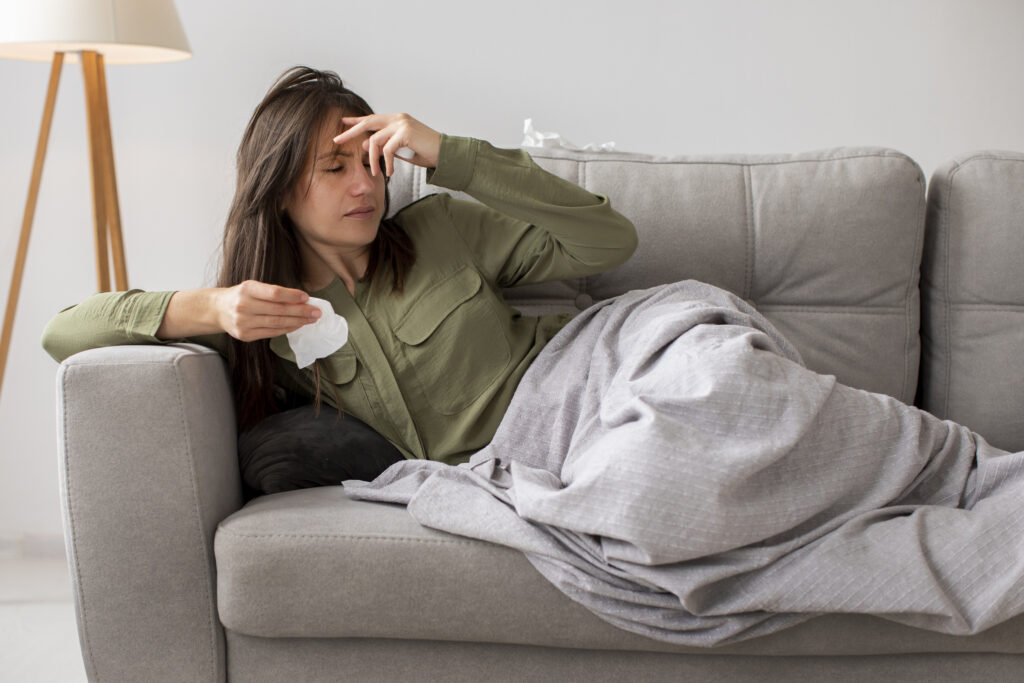Overview
Body aches and chills can be accompanied with or without a fever. Body aches can result from a multitude of causes, including inflammation in the body and muscle tension. Chills are a phenomenon by which the body warms itself up by contracting and relaxing the muscles. Infection, inflammation, allergies, cold weather, and stress are common causes of body aches and chills. Fever, chills, body aches, headache, fatigue, and no cough are easy enough to identify and blame on a cold/flu. However, sore throat, stuffy nose and no fever can confuse you and can be caused by other conditions. Let us explore the causes behind these symptoms.
How to differentiate between cold and flu symptoms?
Fever, body aches, and headaches can indicate the start of a cold or flu. Cough and fever or fatigue and cough are symptoms that go hand in hand. No wonder the terms cold and flu are used interchangeably, but they are actually different. The common cold and the flu are caused by different viruses. Moreover, influenza sets in suddenly and is usually worse. Cold develops gradually, and symptoms include stuffy nose, sneezing, sore throat, fever, etc.
Symptoms of influenza include fever, chills, muscle and body aches, fatigue, and headaches. Sore throat and nasal congestion are likely symptoms of influenza. A common cold tends to resolve without any serious health implications, but influenza may develop into pneumonia or inflammation of the heart in the elderly or those with a weakened immune system.
What are the causes of chills but no fever?
Experiencing body aches and chills but no fever can be brought on simply by the cold weather:
Some other causes include:
- Stress
- Allergies
- Dehydration
- Infections
- Chronic health conditions or autoimmune conditions
- Medications
Similarly, a sore throat, cough, and fever can be caused by these conditions.
1. Stress
Persistent stress can cause the body to release adrenaline that initiates the fight-or-flight response.
‘‘Fight-or-flight causes the heart to beat faster and increases muscle tension. The increased muscle tension can cause body aches and even chills as stress alters the temperature control mechanism of the body,’’ says Dr Richard, a physician at Your Doctors Online.
2. Allergies
Nasal congestion, sneezing, or watery eyes are symptoms attributed to seasonal allergies. Less commonly, allergies can lead to body aches, chills, and headaches, as the allergen usually triggers an inflammatory response.
3. Dehydration
Drinking insufficient fluids can result in dehydration. Moreover, the body can lose fluid too quickly in case of excessive vomiting or diarrhea, excessive sweating, urination, infections, malnutrition or intensive burns.
Water is a requirement for most body functions and is an important component of tissues, including the muscle tissue. Hence, dehydration leads to body aches. Additionally, it affects the temperature regulation mechanisms of the body, leading to chills.
4. Infections
Cough, fever, headache or sore throat, fever and body aches are symptoms of viral or bacterial Infection. As the immune system fights off the invader, inflammatory chemicals are released, raising the body’s temperature, resulting in fever, chills or both.
Bacterial Infection including strep throat, pneumonia or lyme disease may or may not be accompanied by a fever but can present with a sore throat and body aches or chills.
Chills are again caused by the activation of the inflammatory response as the body attempts to kill the bacteria.
5. Chronic Conditions
Several chronic and autoimmune conditions that could cause these body aches and chills without an accompanying fever include:
- Fibromyalgia
- Diabetes
- Pancreatitis
- Chronic fatigue syndrome
- Multiple sclerosis
- Kidney disease
- Liver disease
- Hypothyroidism
- Polymyalgia rheumatica
6. Medications
Examples of medications that can cause body aches or chills include:
- Certain antibiotics
- Opiate pain medication
- Statins
- Diuretics
- Serotonin-reuptake inhibitors (SSRIs)
- Chemotherapy
How to get rid of fever, chills, and body aches?
Prescription Medications:
Medical treatment is ensued depending on the cause of the illness. For example, medications are prescribed to treat an underlying bacterial infection or a chronic disease.
Over the counter Medications
Over-the-counter painkillers, including Tylenol (acetaminophen) or Nonsteroidal anti-inflammatory drugs (NSAIDs) , mainly ibuprofen, can help alleviate inflammation and pain. If allergies are the potential culprit, OTC allergy medications such as loratadine and cetirizine can be used.
Home Remedies
Heat Therapy
Running a warm bath or shower or using heating pads can help warm you up and relax your muscles. Adding Epsom salt to the bath can further help relieve muscle pain.
Hydration
Consuming enough fluids and tracking your fluid intake can help you recover from dehydration. Lemon water, herbal teas, or clear broths are good choices in the absence of a fever.
Light Exercise
Gentle stretches, yoga, or walking may help reduce muscle aches and help manage stress. However, strenuous exercise can worsen muscle strain and body aches.
Relaxation and Stress Management
Practicing stress management techniques and deep breathing exercises helps calm the mind and body, which is helpful in cases of stress-induced symptoms.
When to consult a doctor?
If you have had flu symptoms for three weeks now or body aches and chills without a fever, it is vital to discuss your case with a doctor. Causes can range from an infection or illness to cold exposure, allergies,stress or dehydration, or medications. The treatment depends on the underlying cause. Home treatment does not always resolve symptoms; speak to our professionals at Your Doctors Online.
FAQs about the fever body aches headache
Yes, it is possible to have the flu without a cough. A sore throat or a cough may not always accompany a flu, and you can experience a fever, chills, body aches, and nasal congestion only.
Different infections present with various symptoms. Even when you have a cold or flu, you may not have the same symptoms each time. You can get a cough with no fever or may experience a fever and body aches but no other symptoms.
Chills can simply result from cooler temperatures, but other conditions that can lead to chills include stress, allergies, Infection, or inflammation in the body.
The body has a mechanism in place to regulate temperature. The body can raise the temperature in response to an inflammatory reaction or exposure to an infection, causing you to feel feverish.







